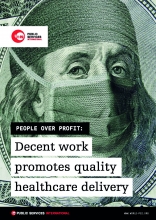Decent Work for Health for All

This informed the constitution of the United Nations Secretary General’s High-Level Commission on Health Employment and Economic Growth, on which I had the singular honour of representing workers and the public services. The recommendations of the High-Level Commission were far-reaching. They have been taken up as the Working for Health programme, established by the 70th World Health Assembly last year.
The programme aims at quantitative and qualitative expansion of the health and social workforce. It is not enough to have more health workers; decent work should be generalised. The terms and conditions of employment of all health workers must be set in a way that motivates them to continue working in the sector.
Many health and social workers have left the sector to seek employment in other areas of work. Their morale has been dampened by poor remuneration on one hand and overwork on the other. Tens of thousands of health and social workers suffer burnout on the job every year, because most governments appear to be unconcerned with the need to institute safe and effective staffing for health.
The International Labour Organization has also taken a stand to promote decent work in the health sector. At its meeting last November, the ILO Governing Body endorsed the conclusions of the ILO Tripartite Meeting on Improving Employment and Working Conditions in the Health Services held in the second quarter of 2017.
We need all hands on deck to ensure decent work for health workers. National governments and all relevant stakeholders, must prioritize health system strengthening, including ensuring an adequately skilled and compensated health workforce. This can be comprehensively achieved only with a robust public health system.
Private provision of health services, including through Public Private Partnerships (PPPs), entails the commodification of these services as well as of the labour of health workers who deliver them. It is the people who require health and social services the most who suffer from such marketization of health.
A recent disturbing example is the report of a survey of nursing and care homes across the United Kingdom by the University College London. In 91 out of the 92 care homes comprising the sample population, abuse and neglect was generalised. The main reason for this was that the homes, run by private providers as PPPs were understaffed and carers were obviously burnt out.
We cannot allow such a despicable situation to continue. Our health is not for sale and people must come before profit. PSI made it clear at the side event we organised during the 4th Global Forum on Human Resources for Health in Dublin last November, that “achieving universal health care requires our placing people at the centre of the required reimagining of health systems, for the unfolding future.”
PSI remains committed to health for all. And we call on governments across the world to collaborate more closely with health sector unions as social partners, and invest in the improvement of employment and working conditions of health workers to make universal health care a reality.
This article is an extract from the “Right to Health” newsletter issue 04 (April/May 2018). Subscribe to the newsletter. Send us your stories.

